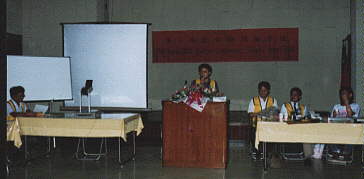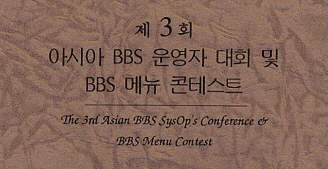See below about the "Chohcho" (Butterfy) Song

2nd Asian BBS Sysops' Conference June, 1991
Joji Sawai speaks, as Honlin Lue (left) and Yoshi Mikami second from right) listen.

The Asian BBS Sysops' Conference has been held since 1990, to foster communication among the amateur BBS system operators (SysOps) in Asia. Its participants have been both SysOps and users in East Asia, and it has been based on a joint preparation of Taiwan's Honlin Lu, Korea's Sangkil Lee, Japan's Yoshi Mikami and their friends.
The Asian BBS Sysops' Conference has been held five times:


The status of BBS networking in East Asia in late 1993 was: In Taiwan, most of the users were on the FidoNet amateur BBSes, although the TTN-Serve commercial network was offered. In Korea, the people were using the HITEL, Chollian and POS-Serve commercial networks as well as the amateur BBSes networked by Horongbul message exchange protocol. In Japan, the commercial networks like NIFTY-Serve, PC-VAN, etc. were more used than the amateur BBSes that were mostly independently run, although FidoNet BBSes were emerging.
Last June, I had an interesting experience in Taipei. During the intermission of the Asian BBS Sysops' Conference where the Japanese, Korean and Taiwan representatives gathered, I sang the Japanese children's
song called "Chohcho, chohcho!" (Butterfly, butterfly!). Then, our Korean and Taiwan friends also sang this song in Korean and Chinese. It is originally a German children's song, which the Japanese Ministry of Education (Monbusho) included in the Japanese school songs during
the Meiji Period.
In Chinese, the song talks about the buzzy bees. The people in mainland China may not know this song because they never got under the influence of Monbusho. How does the Korean version go?
July 30, 1991 Yoshi Mikami, Taipei, Taiwan
In original German:
"Haenschen Klein"
"Little Johnnie"
(English translation by Mataro Miyazaki in NIFTY-Serve's Foreign
Language Forum 07/28/91; slightly modified by Yoshi Mikami)
Haenschen klein ging allein in die weite Welt hinein.
Little Johnnie went alone from home into the wide world.
Stock und Hut steht ihm gut, ist ganz wohlgemut,
His stick and hat suited him well; he was so ambitious.
Aber Mutter weinet sehr, hat ja nun kein Haenschen mehr.
But his mother cried and cried because he was no longer with her.
"Wuensch dir Glueck," sagt ihr Blick, "Kehr nur bald zurueck!"
"Wish you good luck," her glance was telling, "Come back home soon!"
Sieben Jahr, trueb und klar, Haenschen in der Fremde war.
Little Johnnie spent abroad seven years, shiny and cloudy days.
Da besinnt sich das Kind eilet heim geschwind.
Now, it's time to come home and he rushes home quickly.
Doch nun ist's kein Haenschen mehr, nein, ein grosser Hans ist er.
But he is no longer Little Johnnie. Oh, no, he is an adult John.
Stirn und Hand braun gebrannt, wird er wohl erkannt?
Who would know him as Johnnie, with his tanned face and arms?
Eins, zwei, drei gehn vorbei, wissen nicht, wer das wohl sei.
One, two, three, people passs by without knowing who he is.
Schwester spricht: "Welch Gesicht!," kennt den Bruder nicht.
His sister says: "Who are you!"; she couldn't recognize her brother.
Kommt daher die Mutter sein, schaut ihm kaum ins Aug' hinein,
So, his mother comes and looks at him almost into his eyes,
Ruft sie schon: "Hans, mein Sohn! Gruess dich Hans, mein Sohn!"
She shouts: "John, my son! How are you doing, John, my son?"
In Japanese:
"Butterfly, Butterfly"
Chohcho, chohcho, na no ha ni tomare,
Butterfly, butterfly, stop by the rape flowers.
Na no ha ni aitara, sakura ni tomare,
When you got tired of the rape flowers, stop by the cherry trees.
Sakura no hana no, hana kara hana e,
From one cherry to another cherry, from one flower to another,
Tomare yo, asobe yo. Asobe yo, tomae!
Stop by and play around; and play around and stop by!
In Chinese:
Mi4-feng1-gong1-zuo4 (Xiao3-mi4-feng1)
"Buz Bees Work" (Little Buz Bees)
Weng1 weng1 weng1, weng1 weng1 weng!
Boom, boom, boom! Boom, boom, boom!
Da4 jia1 yi4 qi3 qin2 zuo4 gong1.
Everybody, diligently work together!
Lai2 cong1 cong1, qu4 cong1 cong1.
Come, buz, buz! Go, buz, buz!
Zuo4 gong1 qu4 wei4 nong2.
We work with much happiness.
Tien1 nuan3 hua1 hao3 bu2 zuo4 gong1,
If we do not work on these warm days with good flowers,
Jiang1 lai2 na4 li hao3 guo4 dong1.
How should we pass the winter that is coming soon?
Da4 jia1 yi4 qi3 qin2 zuo4 gong1.
Boom, boom, boom! Boom, boom, boom!
Bie2 xue2 lan3 duo4 chong2.
Don't try to learn to be a lazy bee!
In Korean:
... (Does anybody know?)
アジアBBSホームページ
三上吉彦とその友人達のホームページ提供
Click to move to the English Part
アジアBBSシスオペ大会は、アジアのアマチュア・パソコン通信ホスト(Bulletinboard System、BBS)の所有者が自由に意見を交換出来る場として1990年から開催されています。大会の参加者は主に東アジアのBBSシスオペとBBSユーザーで、大会の準備は台湾の呂陳蒼林((リュチェン・ツァンリン、Honlin Lu)、韓国のイ・サンキル(李相吉、Sangkil Lee)、日本の三上吉彦(Yoshi Mikami)と友人達が中心となって大会を準備しました。
アジアBBSシスオペ大会はこれまで5回開催されています。


東アジアのBBSの状況は(1993年末当時)、台湾は商用ネットワークTTN-Serveがあるが、大部分のユーザーはアマチュア・ネットワークであるFidoNet BBSを利用している。韓国は、HITEL、Chollian、POS-Serveなど商用ネットワークも使われているが、ホロンブル(Horongbul)というメッセージ交換技術を利用したアマチュアBBSネットワークが盛んである。日本は、FidoNetを利用しているBBS局もあるが、アマチュアBBSは独立した地方的なものが大部分で、ほとんどのユーザーはNIFTY-Serve、PC-VANなどの商用ネットワークを使っている。
この6月に台北で、面白い経験をしました。日本・韓国・台湾の代表が集まった「アジアBBSシスオペ大会」の余興で童謡「ちょうちょう、ちょうちょう」を歌ったところ、韓国と台湾の人もそれぞれ韓国語と中国語で歌ってくれました。この歌はもともとドイツの子供の歌ですが、明治時代に文部省が小学唱歌にしたものです。
中国語では、蜜蜂が働く様子に変わっています。大陸の中国人は、文部省の統制下にあったことはないので、この歌は知らないでしょうね。韓国語では、何を歌ったものでしょうか。
平成3年7月30日 三上吉彦(台湾、台北市)
In original German: もともとのドイツ語で:
"Haenschen Klein"
"Little Johnnie"
(English translation by Mataro Miyazaki in NIFTY-Serve's Foreign
Language Forum 07/28/91; slightly modified by Yoshi Mikami)
Haenschen klein ging allein in die weite Welt hinein.
Little Johnnie went alone from home into the wide world.
Stock und Hut steht ihm gut, ist ganz wohlgemut,
His stick and hat suited him well; he was so ambitious.
Aber Mutter weinet sehr, hat ja nun kein Haenschen mehr.
But his mother cried and cried because he was no longer with her.
"Wuensch dir Glueck," sagt ihr Blick, "Kehr nur bald zurueck!"
"Wish you good luck," her glance was telling, "Come back home soon!"
Sieben Jahr, trueb und klar, Haenschen in der Fremde war.
Little Johnnie spent abroad seven years, shiny and cloudy days.
Da besinnt sich das Kind eilet heim geschwind.
Now, it's time to come home and he rushes home quickly.
Doch nun ist's kein Haenschen mehr, nein, ein grosser Hans ist er.
But he is no longer Little Johnnie. Oh, no, he is an adult John.
Stirn und Hand braun gebrannt, wird er wohl erkannt?
Who would know him as Johnnie, with his tanned face and arms?
Eins, zwei, drei gehn vorbei, wissen nicht, wer das wohl sei.
One, two, three, people passs by without knowing who he is.
Schwester spricht: "Welch Gesicht!," kennt den Bruder nicht.
His sister says: "Who are you!"; she couldn't recognize her brother.
Kommt daher die Mutter sein, schaut ihm kaum ins Aug' hinein,
So, his mother comes and looks at him almost into his eyes,
Ruft sie schon: "Hans, mein Sohn! Gruess dich Hans, mein Sohn!"
She shouts: "John, my son! How are you doing, John, my son?"
In Japanese: 日本語で:
「ちょうちょう、ちょうちょう」
"Butterfly, Butterfly"
ちょうちょう、ちょうちょう、菜(な)の葉(は)に留(と)まれ。
Butterfly, butterfly, stop by the rape flowers.
菜(な)の葉(は)に飽(あ)いたら、桜(さくら)に留(と)まれ。
When you got tired of the rape flowers, stop by the cherry trees.
桜(さくら)の花(はな)の花(はな)から花(はな)へ、
From one cherry to another cherry, from one flower to another,
留(と)まれよ、遊(あそ)べよ。遊(あそ)べよ、留(と)まれ。
Stop by and play around; and play around and stop by!
In Chinese: 中国語で:
「蜜蜂工作」(小蜜蜂)
Mi4-feng1-gong1-zuo4 (Xiao3-mi4-feng1)
"Buz Bees Work" (Little Buz Bees)
口+翁 口+翁 口+翁 口+翁 口+翁 口+翁,
Weng1 weng1 weng1, weng1 weng1 weng!
Boom, boom, boom! Boom, boom, boom!
大 家 一 起 勤 做 工。
Da4 jia1 yi4 qi3 qin2 zuo4 gong1.
Everybody, diligently work together!
來 匆 匆 去 匆 匆,
Lai2 cong1 cong1, qu4 cong1 cong1.
Come, buz, buz! Go, buz, buz!
做 工 趣 味 濃。
Zuo4 gong1 qu4 wei4 nong2.
We work with much happiness.
天 暖 花 好 不 做 工、
Tien1 nuan3 hua1 hao3 bu2 zuo4 gong1,
If we do not work on these warm days with good flowers,
將 來 那 裏 好 過 冬。
Jiang1 lai2 na4 li hao3 guo4 dong1.
How should we pass the winter that is coming soon?
口+翁 口+翁 口+翁 口+翁 口+翁 口+翁,
Da4 jia1 yi4 qi3 qin2 zuo4 gong1.
Boom, boom, boom! Boom, boom, boom!
別 學 懶 惰 蟲。
Bie2 xue2 lan3 duo4 chong2.
Don't try to learn to be a lazy bee!
In Korean: 韓国語で:
...
Top of Page